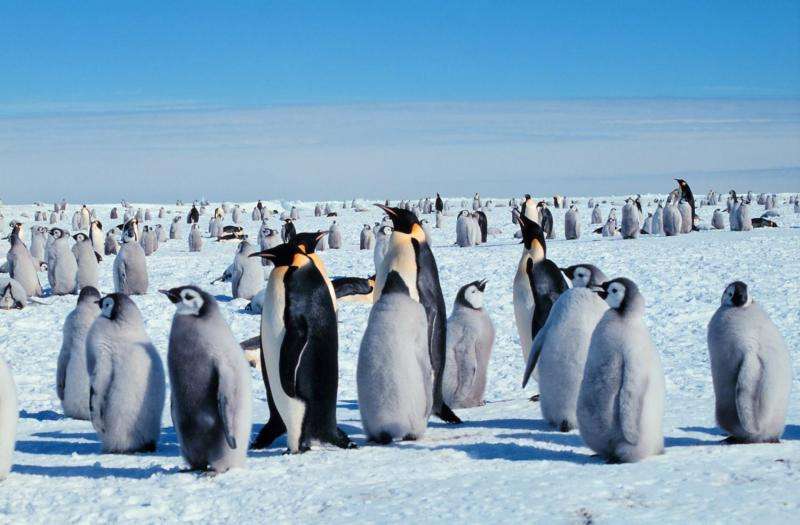Adults with chicks. Credit: Public Domain
The endurance of emperor penguins, trudging through the perpetual Antarctic night to their breeding colonies, is legendary. Many trek more than 100 km from their ocean feeding grounds to rookeries at inland locations in preparation for mating; and the male partners often face a lengthy fast of more than 100 days while mating and incubating their eggs before embarking on the lengthy return journey.
However, Gerald Kooyman from the University of California San Diego explains that not all emperor penguin colonies are as icebound. 'The Ross Sea colonies are near the fast sea-ice edge (unbroken sea ice attached to the coastline), meaning that they are within easy walking distance [of the water]', he explains. So when he was offered the opportunity to join an expedition heading south to the Ross Ice Shelf on the Icebreaker Nathaniel B. Palmer during the austral winter of 1998 to survey the region's animals, Kooyman snatched it up. While there, he and his colleagues observed that emperor penguins from colonies close to the sea-ice edge are able to go diving before their eggs are laid, suggesting that their fasts are significantly shorter than those of more inland emperor penguins. The team publishes the discovery in Journal of Experimental Biology.
Yet, the expedition's success was far from assured at the outset; no ship had ever reached the Ross Ice Shelf during winter. However, after successfully reaching their destination, Kooyman convinced the vessel's captain and the expedition Chief Scientist, Martin Jeffries, to make a detour west to Cape Washington to observe an emperor penguin colony during the return journey. As the ship approached the ice edge near the colony in late May, a member of the expedition noticed a group of 30 penguins unexpectedly swimming in the open water. They were diving in the dark, even though the birds were thought only to dive in light conditions in order to avoid predators and becoming entombed beneath the ice when air holes close. 'If the birds can successfully hunt in the dark, it makes sense that they would feed during the prenuptial and pre-laying period', explains Kooyman.
Disembarking from the ship, Kooyman, Robert van Dam and several other members of the expedition set off in search of the colony. 'In the rough ice at 6?4?, Robert was an excellent spotter of seals and penguins', Kooyman recalls, adding that the team also encountered two groups of penguins returning to the colony from the open water during the moonless 4 km trek. And when the scientists reached the colony, they found countless tracks, indicating other recent departures for the nearby water. Also, Kooyman and his colleagues arrived while the mating season was still in full swing and before the males has begun incubating their eggs despite the lateness of the season - when other colonies had already laid their eggs and the females departed.
Considering all of the observations, Kooyman says, 'The [Cape Washington] breeding males may have a shorter fast because they feed between arrival at the colony and over the ensuing 2 months during the pre-nuptial activities'. In contrast to the 115 day fast experienced by birds that head far inland to mate and incubate their eggs, he suspects that these emperor penguins may endure a shorter fast of a a minimum of 65 days.
After locating the colony, Kooyman collected and weighed four of the birds and attached satellite tags that would track their movements for several months. Later, when the satellite data began returning, he saw that the first bird departed the colony 9 days after the tag was fitted, followed by the three remaining penguins during the next fortnight. And when Luis Hückstädt analysed the paths taken by the birds, it was clear that they were all diving in dark conditions before the sun's return.
Kooyman warns that as the rise in Antarctic temperatures persists, many more emperor penguins may be forced to dive in the dark if the ice around the northern perimeter of the continent continues thinning, driving colonies further south in search of more stable breeding grounds.
More information: Kooyman, G. L., van Dam, R. P. and Hückstädt, L. A. (2018). Night diving by some emperor penguins during the winter breeding period at Cape Washington. J. Exp. Biol. 221, DOI: 10.1242/jeb.170795
Journal information: Journal of Experimental Biology
Provided by The Company of Biologists























